The population greatly increased as families moved into
the area, mainly due to the improvements in transport which
allowed people to live in a rural area and commute to jobs
in the Black Country and Birmingham. The population in
Aldridge increased as follows:
| 1901 |
2,478 |
| 1921 |
11,500 |
| 1981 |
26,500 |
|
|
|
|

Aldridge Urban
District Council in 1934. |
In the Second World War local
industries consisted of brick making, engineering (several
small engineering firms), and plastic moulding at Streetly
Works which also produced munitions. It later concentrated
on railway detonators, and small plastic mouldings.
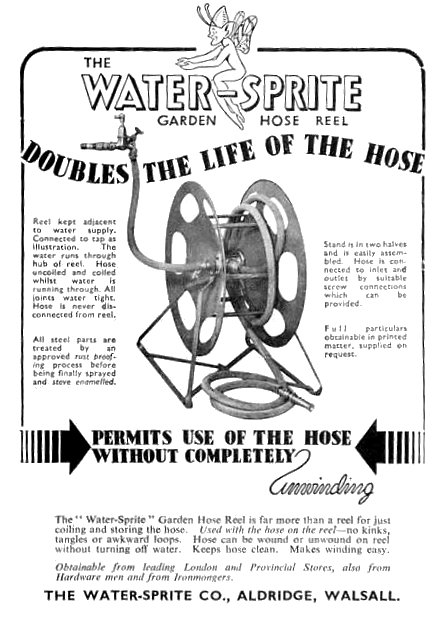
An advert from 1946.
Recent Industries
Several new factories appeared in the
1950s, mostly located on the Redhouse Industrial Estate,
Empire Industrial Park, and also on land near Walsall Wood.
|

An advert from 1958.
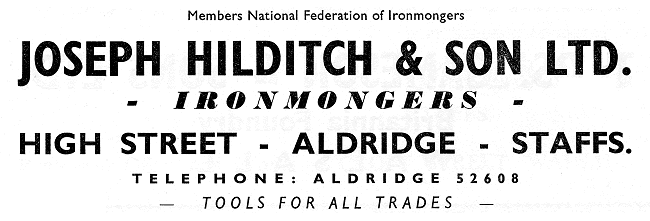
An advert from 1958.
|

An advert from 1974. |
In 1951, a new GKN subsidiary, Blade
Research & Development (BRD) was formed on the Redhouse
Industrial Estate, employing around 1,000 people to produce
aero-engine turbine blades.
Following a fall in demand in
the late 1950s, the BRD factory switched production to
constant-velocity joints and drive shafts for vehicles.
Another company that came to the town
in the 1950s was Birlec, a manufacturer of industrial
electric furnaces. The business was founded in 1927 in
Erdington, Birmingham, as the Birmingham Electric Furnace
Company.
In 1954 it was taken over by Associated Electrical
Industries (AEI) and relocated to Aldridge where electric
arc furnaces with smelting capacities of up to 100 tons were
produced. Sadly it has since closed. Another long-standing
company, the Ibstock brickworks in Stubbers Green Road
continues to produce large quantities of bricks of all
kinds.
|
|
Another successful firm was Harold Bird
& Son, golf club manufacturers based at Northgate. In the
late 1950s Birlec, which manufactured industrial furnaces
moved to Aldridge, but has now closed. In 1968 Aldridge
Plastics Limited opened to produce plastic injection
mouldings. It survived until 2007.
In January 2011 GFP
Engineering Limited moved to Morford Road to produce Glass
Reinforced Plastic (GRP) mouldings.
Another important
company that moved to the area in the 1950s is McKechnie
Brass, the last brass extrusion manufacturing company in the
country.
It used scrap brass sourced in the UK to produce
brass rods and profiles for a range of products including
pins for plugs, door locks and padlocks, lift tracks and
overhead conductive wire for the railway industry. Sadly the
firm went out of business in 2013, having accrued debts of
£3.8 million. Sixty people lost their jobs.
|

An advert from 1976. |
|
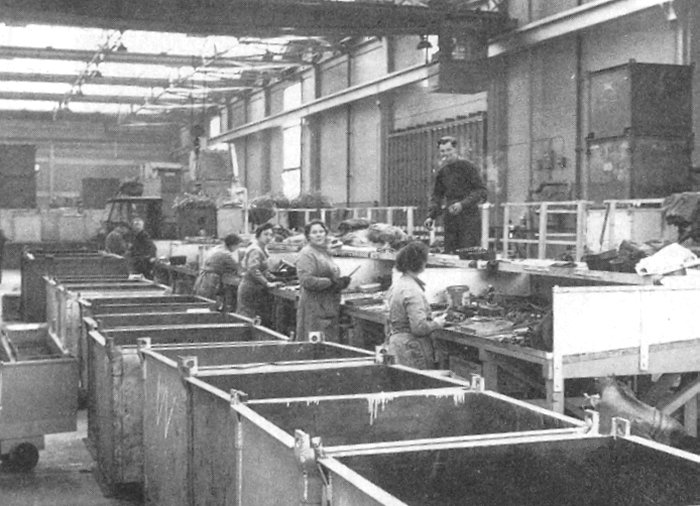
McKechnie Metals Limited in 1958. |
|
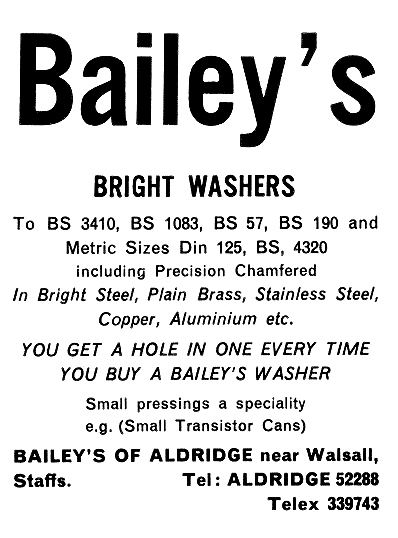
An advert from 1976. |
Local government changed several times
in the latter part of the twentieth century, beginning with
the formation of Aldridge Urban District Council in 1934.
The council, formed from the eastern parishes of the former
Walsall Rural District Council, included Aldridge, Great
Barr, Pelsall, Pheasey, Rushall, and Streetly. The Council
met at new offices in Aldridge.
In May 1964 Aldridge was twinned with Montelimar
in France.
In 1966 Aldridge and Brownhills urban
districts merged, then in 1974, under the terms of the 1972
Local Government Act, the Metropolitan Borough of Walsall
was formed, including both Aldridge and Brownhills. It had a
total population of over 270,000.
The population of Aldridge continued to
grow as large housing estates were built, and people
continued to move into the area. Between 1921 and 1981 the
population more than doubled, increasing from 11,500 in 1921
to 26,500 in 1981.
|
| In 1933 Anchor Road contained about six houses,
but by 1940 it had grown into the centre of a much enlarged
village with the new Council House, the police station, the
police court, the Avion Cinema, several shops,
Aldridge Methodist Church, and more recently Aldridge
Shopping Centre, off Anchor Road. The Avion Cinema opened on the 26th
September, 1938, with a visit by George Formby, and a
showing of his latest film ‘I See Ice’. As well as films,
there were variety shows, which were quite popular. The
cinema remained open until the 1960s when many cinemas were
suffering from declining audiences. It closed on the 30th
December, 1967 then reopened as a bingo hall which became
The Gala Bingo Club. This survived until the 1st August,
2009, when the building was put up for sale. It was acquired
by J. D. Wetherspoon, and reopened on the 9th July, 2013 as
The Avion.
The many other local pubs include The
Plough & Harrow, on Chester Road, the Old Irish Harp, also
on Chester Road, the Boatmans Rest in High Street, and The
White House in Bosty Lane.
|
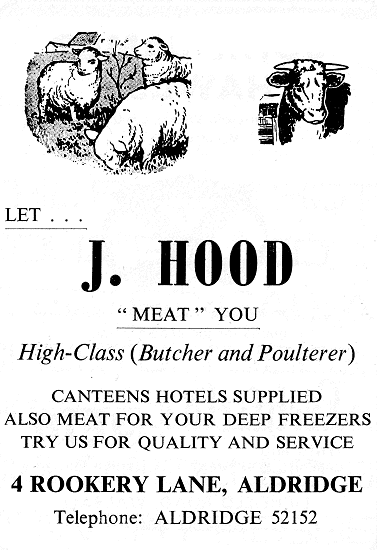
An advert from 1974. |
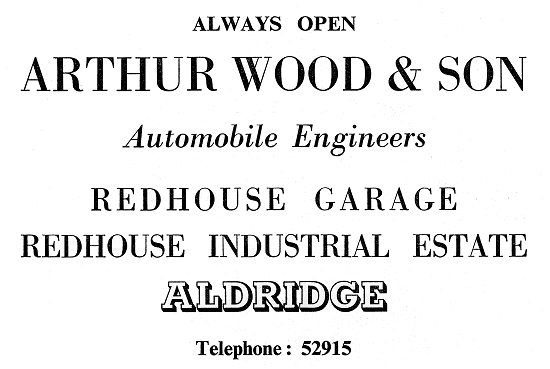
An advert from 1958.
|
Aldridge has several sports clubs
including Aldridge Cricket Club, founded in 1853, and based
at 'The Stick and Wicket' on the green behind the parish
church, and Aldridge and Walsall Hockey Club, also based at
'The Stick & Wicket'.
There is also
Aldridge Rugby Football Club, formed in 1998 from an
amalgamation of Witton and Old Centrals rugby clubs. It is
based at the Old Centrals sports ground at Bourne Vale.
Another popular sports club is Druids Heath Golf Club
which has
a championship 18 Hole Golf Course.
There are several activity groups
catering for younger people, including Aldridge Youth
Theatre in Noddy Park Road where a pantomime
and several plays are performed every year. The 1st Aldridge
Girl guides, two brownie groups, and a rainbow group meet at
the Methodist Church, as does the 33rd Walsall Scout group. The 49th Walsall Scout Group
meets at St. Thomas's Church in Churchside Way, and a
church youth group meets at St. Mary's Parish Church.
Aldridge has grown into a prosperous
suburb of Walsall, with a large population, well catered for
by local shops and amenities, and excellent roads and
transport. It will no doubt continue to grow, as it is an
attractive place to live, and within easy commuting distance
of Birmingham and other towns in the Black Country. The many
primary schools include Cooper and Jordan (CE), Leighswood,
St Mary of the Angels (Catholic) and Whetstone Field. Secondary
schools include Aldridge School, and St Francis of Assisi Catholic
Technology College.
Although most of the old shops in the centre
were demolished, and large housing estates have been built at Coppy
Hall, Druids Heath, Leighswood, and Redhouse, many of the better old
buildings still remain, and a conservation area has been designated
on the eastern side of the village. Some of the buildings are on the
Statutory List, and the Local List. They are as follows:
Statutory List:
|
Building |
|
Listing |
| The Moot House. |
|
Grade II |
| Bosty Lane Farmhouse and farm building adjoining to
the east. |
|
Grade II |
| Barn south west of Bosty Lane Farmhouse. |
|
Grade II |
| Nos. 179 and 179A
Castlehill Road. |
|
Grade II |
| The Old Irish Harp Public House. |
|
Grade II |
| Doe Bank Lane Farmhouse and farm buildings attached. |
|
Grade II |
| Barn adjoining at right angles to Doe Bank Farmhouse. |
|
Grade II |
| The Cottage,
No. 2 Erdington Road. |
|
Grade II |
| The Shrubbery,
Erdington Road. |
|
Grade II |
| The Old Rectory, The
Green. |
|
Grade II |
| The Church of St
Mary The Virgin, The Green. |
|
Grade II* |
| Old Hall Farmhouse,
Old Hall Lane. |
|
Grade II |
| Barn approximately 20 metres north of Old Hall Farmhouse. |
|
Grade II |
| Cedar Court, Walsall
Wood Road. |
|
Grade II |
| Outbuilding approximately 10 metres northwest of Cedar Court. |
|
Grade II |
| Shutt Cross House,
No. 70 Walsall Wood Road. |
|
Grade II |
|
Local List:
|
Building |
| Police Station, Anchor
Road. |
| Former Avion Cinema,
Anchor Road. |
| Farmhouse, No. 15 Barr
Common Road. |
| Barr Beacon War
Memorial, Beacon Road. |
| Bourne Vale House &
Farmyard, Bourne Vale. |
| Branton Hill Lane
Railway Bridge. |
| Bourne Farm, Chester
Road. |
| Chester Road Railway Bridge. |
| Erdington Road Railway Bridge. |
| The Laurels, Knights
Hill. |
| The Old Maltings, Little
Aston Road. |
| Aldridge Court, Little
Aston Road. |
| No. 219 Little Aston
Road. |
| Lee House, No. 23
Walsall Wood Road |
| Noddy Cottages, Nos.
48-50 Walsall Wood Road. |
| Whetstone Lane Railway Bridge. |
|
References:
Men of Aldridge. James T. Gould. 1957.
G. J. Clark Limited, Bloxwich.
Aldridge & District Yesterdays. 1984.
Walsall Metropolitan Borough Archives Service.
Walsall Official Town Guides, and
directories.
|
 |
|
 |
Return to
The 20th Century |
|
Return to
the contents |
|